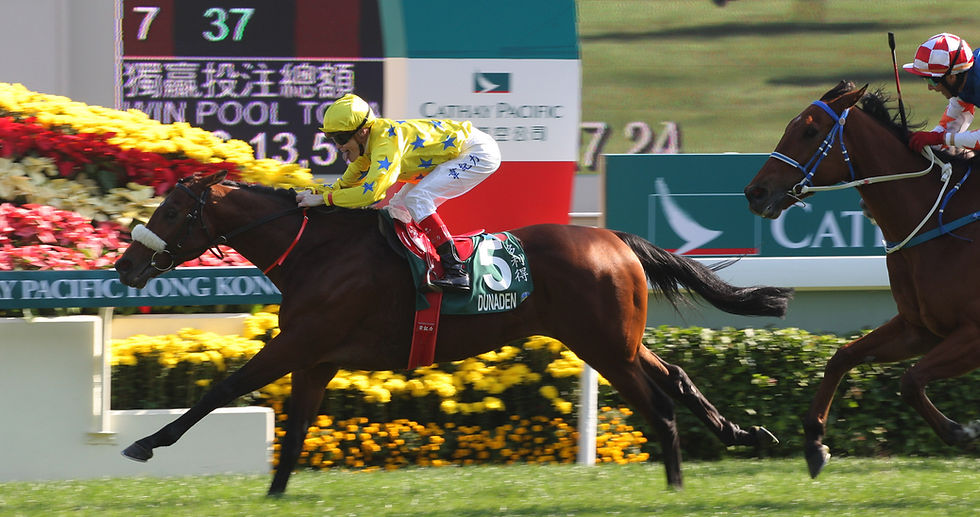Is Hong Kong's December showpiece under the threat of Japan Cupification?
- Alan Aitken

- Dec 13, 2018
- 4 min read

On a cool, glorious Sha Tin afternoon, the Longines International that carries the least enthusiasm for the local fans was the key result of the entire afternoon on Sunday.
Not that the full suite of international events was not telling as the hometown heroes claimed eight of the twelve placings across the showpiece G1 races, but Exultant's HK Vase victory underlined the looming danger of 'Japan Cup Syndrome' at Sha Tin in December.
In the two decades from 1985 to 2005, foreign raiders won 11 of the Japan Cups run. There were wins to Ireland, the United States, England, Germany, Australia and New Zealand and the race's emergence as the peak international turf staying event coincided with - or perhaps assisted with - the rise of Japan's gallopers to a place of eminence in the world. So much so that they began to more than hold their own.
When champion galloper Deep Impact won the Japan Cup in 2006, he

began an uninterrupted run of local winners since and the race has declined as an international attraction, with even foreign runners hard to find in recent years, let alone participants able to match the Japanese.
It isn't that the distance between the rest of the world and Tokyo has become greater, nor that there are no star gallopers being produced anywhere else.
It just became too hard to win.
In the days of Lando, Singspiel, Pilsudski or Falbrav, their trainers were often lining them up in Japan knowing the other European stars they knew well were the horses to beat.Heck, even Prix de l'Arc de Triomphe winners ran in the Japan Cup. Now the path is all east to west for Japan's perennial bid to breach the Arc's defences and the Japan Cup is virtually a domestic race again.
The difficulty is that once these international events become too hard to win on away grounds, connections start to look for easier tasks, domestically or even at different overseas venues.
This was a danger that loomed over the HK Sprint when the HongKong horses appeared to have a vice-like grip on it in the post-Falvelon years, through the Silent Witness and Sacred Kingdom eras. But then wins to J J The Jet Plane for South Africa and then back to back success for Japanese monster Lord Kanaloa

returned the Sprint to a perception that it could be won.
Likewise, the HK Mile win by Japan's Maurice in 2015 was a welcome break after a decade-long local dominance.
The HK Cup has seemed where the foreign and local prospects appeared to intersect in a fair contest - in the past 20 runnings, 12 have been won by foreign-trained runners. But even that middle distance contest has been undergoing a Japan Cup-style transformation.
Glorious Forever on Sunday made it 6 of the last 8 HK Cups have been won by Hong Kong horses, the other two by...yep, Japan.
So the Sprint and Mile are both drifting back into a locals-only zone again over the last few years - legitimate runners are even becoming tough to attract - and the results of the Cup are leaning to Hong Kong too.
But the Europeans always had the Vase.

Yes, there were Japanese wins there too in 2001 and 2016, but it mostly belonged to the French, the British, the Irish, punctuated by the local wins in 1998 and 2013.
On Sunday, Hong Kong's four starters didn't just take the big end of the prize with Exultant, but ran first, fourth and sixth. Yes, there was a lot of trouble in the race - especially harming the chances of France's Waldgeist - and the absence of which might have produced a different finish. But the records say that Hong Kong and Japan drew clear to fight it out and Hong Kong prevailed for a second win in five years in a race that had been once been all but roped off for visitors.
It isn't the end of the European Vase visitors, that seems certain, but will we look back on this as the first step on a road to declining interest. Hong Kong stayers always had a home ground advantage but not the talent - if they are to start buying the kinds of horses from Europe or Britain which can compete well at a staying distance, that's going to be discouraging.
So, what does anyone do as a victim of their own success? And turning back is an impossible answer, that boat simply can't sail.
The Japanese have gone from strength to strength in terms of recognition in the world but the Japan Cup as a serious intenational event is a foggy memory and the country gets few visitors for any of its races other than the sprinkling from Hong Kong.
At worst, perhaps the Hong Kong international meeting is drifting away from a world turf championships and towards more of a turf Ryder Cup, with Hong Kong and Japan butting heads annually with little intrusion from elsewhere.
Sure, once the quarantine issues are figured out, Australia will probably produce its share of sprinters that want to take on the challenge at Sha Tin. But, let's face it, the Aussies haven't been significant at HKIR for a long time, even before the quarantine problem, and is the appeal of the December meeting for the western hemisphere in danger?



Comments